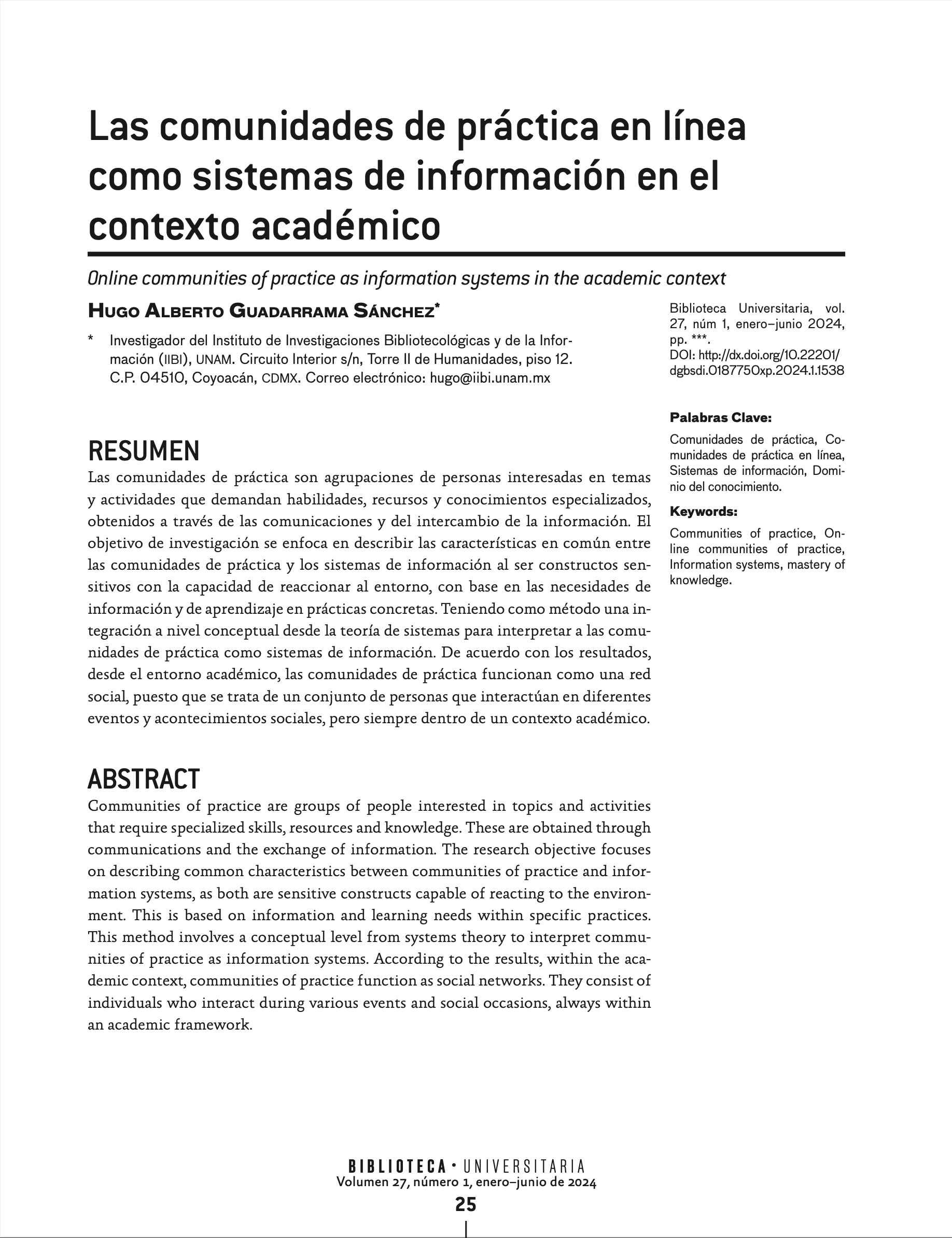Online communities of practice as information systems in the academic context
DOI:
https://doi.org/10.22201/dgbsdi.0187750xp.2024.1.1538Keywords:
Communities of practice, On-line communities of practice, Information systems, mastery of knowledgeAbstract
Communities of practice are groups of people interested in topics and activities that require specialized skills, resources and knowledge. These are obtained through communications and the exchange of information. The research objective focuses on describing common characteristics between communities of practice and information systems, as both are sensitive constructs capable of reacting to the environment. This is based on information and learning needs within specific practices. This method involves a conceptual level from systems theory to interpret communities of practice as information systems. According to the results, within the academic context, communities of practice function as social networks. They consist of individuals who interact during various events and social occasions, always within an academic framework.
Downloads
References
Andreu, R. y Baiget, J. (2016). Gestión del conocimiento y competitividad. Universidad de Navarra. https://enginyeriainformatica.cat/wp-content/uploads/2016/09/Gesti%C3%B3n-del-Conocimiento-y-Competitividad-Presentaci%C3%B3n-libro.pdf
Arquero, R., Cuenca, G., Cobo, S. y Ramos, F. (2014). Comunidades de práctica e innovación: aprender a emprender en el área de Bibliotecología y Ciencias de la Documentación. Investigación Bibliotecológica, 28(63), 193- 222. https://doi.org/10.1016/S0187-358X(14)72580-8 DOI: https://doi.org/10.1016/S0187-358X(14)72580-8
Baker, A. y Beames, S. (2016). Good CoP: what makes a community of practice successful? Journal of Learning Design, 9(1). http://dx.doi.org/10.5204/jld.v9i1.234 DOI: https://doi.org/10.5204/jld.v9i1.234
Baraldi, C. y Corsi G. (2017). Niklas Luhmann: education as a social system. Springer Nature. https://luhmann.ir/wp-content/uploads/2021/07/Niklas-Luhmann-Education-as-a-Social-System.pdf DOI: https://doi.org/10.1007/978-3-319-49975-8
Cundill, G., Roux, D. y Parker, J. (2015). Nurturing communities of practice for transdisciplinary research: nurturing communities of practice for transdisciplinary research. Ecology and Society, 20(2). https://www.jstor.org/stable/26270207 DOI: https://doi.org/10.5751/ES-07580-200222
Fong, W. (2014). Knowledge Sharing in Communities of Practice: Examining Usefulness of Knowledge from Discussion Forums versus Repositories. ACM sigmis, 45(2). https://doi.org/10.1145/2621906.2621908 DOI: https://doi.org/10.1145/2621906.2621908
Giraldo, L. y Atehortúa, L. (2010). Comunidades de práctica, una estrategia para la democratización del conocimiento en las organizaciones, una reflexión. Revista Ingenierías, 9(16), 141-150. https://revistas.udem.edu.co/index.php/ingenierias/article/view/50
Gola, C. y Martin, L. (2020). Creating an Emotional Intelligence Community of Practice: A Case Study for Academic Libraries. Journal of Library Administration, 60(7), 752–761. https://doi.org/10.1080/01930826.2020.1786982 DOI: https://doi.org/10.1080/01930826.2020.1786982
Håkanson, L. (2010). The firm as an epistemic community: the knowledge based view revisited. Industrial and Corporate Change, 19(6), pp. 1801–1828. https://doi.org/10.1093/icc/dtq052 DOI: https://doi.org/10.1093/icc/dtq052
Harris, B. (2008). Communities as necessity in information literacy development: Challenging the standards. The Journal of Academic Librarianship, 34(3), 248-255. https://doi.org/10.1016/j.acalib.2008.03.008 DOI: https://doi.org/10.1016/j.acalib.2008.03.008
Johansen, O. (2002). Introducción a la teoría general de sistemas. Limusa.
Kim, J. (2015). Integrating Communities of Practice into Library Services. Collaborative Librarianship, 7(2). https://digitalcommons.du.edu/collaborativelibrarianship/vol7/iss2/2
Lapiedra, R., Forés, B., Puig, A. y Martínez, L. (2021). Introducción a la gestión de sistemas de información en las empresas. Publicacions de la Universitat Jaume I. https://repositori.uji.es/xmlui/bitstream/handle/10234/194661/Sapientia178.pdf?sequence=4 DOI: https://doi.org/10.6035/Sapientia178
Luhmann, N. (1995). Introducción a la teoría de sistemas. Universidad Iberoamericana.
Maldonado–Maldonado, A. (2005). Comunidades epistémicas: una propuesta para estudiar el papel de los expertos en la definición de políticas en educación superior en México. Revista de la Educación Superior, 34(134), 107-122.
Mohajan, H. (2017). Roles of Communities of Practice for the Development of the Society. Journal of Economic Development, Environment and People, 6(3). https://mpra.ub.uni-muenchen.de/82954/
Ortiz, A. (2016). Niklas Luhmann: teoría emergente de los sistemas sociales. Distribooks editores.
Pan, S. y Leidner, D. (2003). Bridging communities of practice with information technology in pursuit of global knowledge sharing. Journal of Strategic Information Systems, 12(1), 71–88. https://doi.org/10.1016/S0963-8687(02)00023-9 DOI: https://doi.org/10.1016/S0963-8687(02)00023-9
Prieto, A. y Martínez, M. (2004). Sistemas de información en las organizaciones: una alternativa para mejorar la productividad gerencial en las pequeñas y medianas empresas. Revista de Ciencias Sociales, 10(2), 322-337. https://www.redalyc.org/articulo.oa?id=28010209 DOI: https://doi.org/10.31876/rcs.v10i2.25256
Sánchez–Vanderkast, E. (1996). La dependencia informativa. [Tesis de maestría. Universidad Nacional Autónoma de México]. TESIUNAM https://tesiunam.dgb.unam.mx/F/UXTEHH8JKILGS-PQREIG8E94LV6P5M7R6XLXE6NDGYBQ7C-DDHLV-11009?func=full-set-set&set_number=124308&set_entry=000001&format=999
Sharratt, M., & Usoro, A. (2003). Understanding KnowledgeSharing in Online Communities of Practice. Electronic Journal of Knowledge Management, 1(2). https://academic-publishing.org/index.php/ejkm/article/view/686
Van Wyk, J. (2005). Communities of practice in an academic library: a run on the wild side? https://repository.up.ac.za/handle/2263/6427?show=full
Vásquez, S. (2011). Comunidades de práctica. Educar, 47(1), 51-68. https://raco.cat/index.php/Educar/article/view/244622 DOI: https://doi.org/10.5565/rev/educar.71
Wenger, E. (1998). Communities of practice: learning, meaning and identity. Cambridge University Press. https://doi.org/10.1023/A:1023947624004 DOI: https://doi.org/10.1017/CBO9780511803932
Zamora, I. (2018). Comunidades epistémicas en la solución de problemas ambientales: tendencias en la recuperación de ríos urbanos. Espiral, Estudios sobre Estado y Sociedad, 24(71), 115-154. https://doi.org/10.32870/espiral.v25i71.6106 DOI: https://doi.org/10.32870/espiral.v25i71.6106.g6051
Zhang, Wei y Watts, Stephanie. 2008. Online communities as communities of practice: a case study. Journal of Knowledge Management, 12(4), 55-71. https://doi.org/10.1108/13673270810884255 DOI: https://doi.org/10.1108/13673270810884255

Downloads
Published
How to Cite
Issue
Section
License

This work is licensed under a Creative Commons Attribution-NonCommercial-ShareAlike 4.0 International License.
Descargar el formato de Cesión de derechos en formato PDF:
Formato de Cesión de derechos
Imprímalo y una vez que lo haya firmado envíenoslo vía fax o por correo a:
Revista Biblioteca Universitaria:
Dirección General de Bibliotecas y Servicios Digitales de Información de la UNAM
Departamento de Publicaciones
Edificio de la Biblioteca Central, 11o Piso,
Circuito Interior, Ciudad Universitaria, 04510 México, D.F.
Tel 5622-1616,
Fax: 5622-1601,






